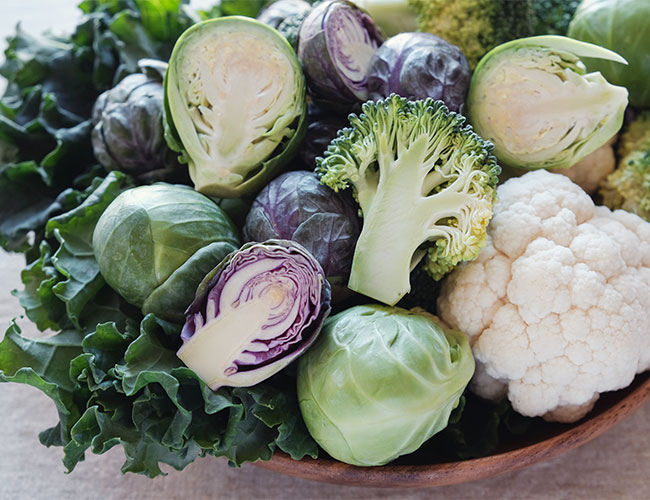Digestive issues like gas and bloating are so uncomfortable—and they’re even more frustrating when you’re not sure what the source of them is. Certain foods can trigger these responses in your body, so getting down to the root of things is one of the best steps to take to reduce these issues and regain comfort.
To learn more about foods you should steer clear of if you struggle with chronic gas and bloating, we spoke to dietitian Dana Ellis Hunnes, PhD, author of Recipe for Survival. Hunnes told us all about one food you may want to avoid if you’re trying to keep your digestive system in order: cruciferous vegetables.


Improperly prepared cruciferous vegetables
You've probably heard health experts constantly stressing the importance of meeting your daily vegetable intake. While veggies are an extremely vital part of a well-balanced diet, some can affect your body in adverse ways. Hunnes says that cruciferous vegetables such as brussels sprouts, broccoli, and cabbage may worse bloating issues.
The main problem with these vegetables is the way in which your body digests them. Hunnes explains that when cruciferous veggies are digesting in your intestines, "their fibers can increase gas production and bloat."
Additionally, she says that when people who struggle with digestive issues eat these vegetables, they should be drinking a lot of fluids. "They are so high in fiber," Hunnes notes, "and a fluid needs to be taken in when consuming them so that their fibers don't just dry out and get compacted in your intestines, worsening the situation." That means you should be sure to have a glass of water on hand next time you're chowing down on some broccoli.
Of course, these are overall healthy foods. They can be a great addition to certain diets, and Hunnes says you can help curb someone of the digestive issues they cause by exercising a bit of caution. "If someone typically has problems with these particular vegetables, I urge them to either eat them in much smaller quantities or prepare them in a way that makes their fibers much easier to digest," she explains.
"Many times, it’s not just the foods we eat," Hunnes continues. "Sometimes it’s about how they are prepared." So, what are the best ways to prepare cruciferous vegetables if you want to avoid bloating? Hunnes suggests puréeing them, or blending them into a soup. Additionally, she recommends "cooking them until they're nice and soft." All of this can make these foods easier to digest, which will help to decrease the risk of any gas and bloating.
So you can breathe a sigh of relief—you don't have to give up these foods forever, even if you struggle with digestive issues. Just make sure to prepare them properly and to keep your portions small. "It's not necessarily that someone has to avoid them, it may just be that they prepare them in a way that reduces the likelihood that they will have glass and bloat," Hunnes concludes. Phew! Got it.


























